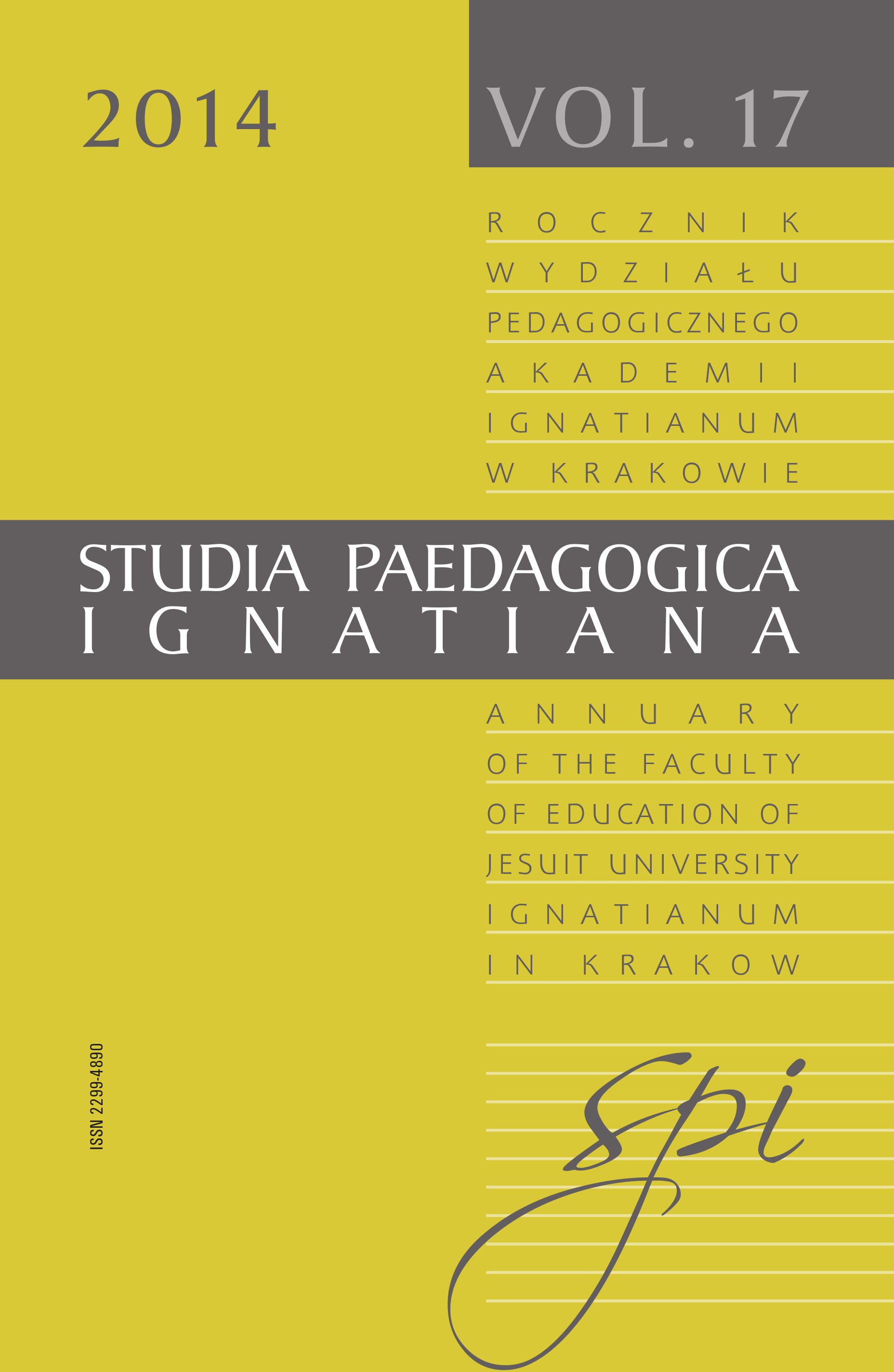The beginnings and development of the Jesuit University Ignatianum in Krakow
DOI:
https://doi.org/10.12775/SPI.2014.001Keywords
The Jesuit University Ignatianum, higher education institution, pedagogy, philosophy, JesuitsAbstract
The author concisely presents the efforts and achievements of the 25-year work of Jesuits with regard to education and shaping of the young Polish generation. Undoubtedly, the presented period is the time of concerted effort and achievements. These changes, among other things, were reflected in the change of the name from the Faculty of Philosophy
to the Jesuit University of Philosophy and Education
Ignatianum (Polish: Wyższa Szkoła Filozoficzno-Pedagogiczna Ignatianum) and then to the Jesuit University Ignatianum in Krakow (Polish: Akademia Ignatianum w Krakowie). The changes in the name result from demanding but beneficial scientific and didactic achievements. Moreover, the article provides the reader with the first names and surnames of the university authorities in the chronological order. It does not fail to mention people who did not hold executive positions but whose devotion and activities have become an integral part of the history of the presented university. The article shows an increase in the number of students and their interest for the educational institution established 25 years ago. Furthermore, the article presents changes which have taken place with regard to the number of courses of study, the educational offer of the university, as well as subjects which used to be obligatory. With hindsight, viewing the development of the university since its beginnings, the author feels deeply respectful of the authorities who created it as well as optimistic about its future. The humble beginnings dating back to the academic year 1989/1990 have brought unexpectedly positive results. Observing the interest for the Jesuit University Ignatianum in Krakow of young people, as well as the diligent work of its teaching staff, one may expect further scientific, didactic and educational achievements in the education of the young generation.
References
„Acta Romana Societatis Iesu” 1932, t. 7. Charakterystyczne cechy jezuickiego wychowania, w: Podstawy edukacji ignacjańskiej, przeł. B. Steczek, Wyższa Szkoła Filozoficzno-Pedagogiczna „Ignatianum” – Wydawnictwo WAM, Kraków 1989.
Congregatio de Institutione Catholica, Prot. N. 400/99.
Darowski R., Filozofia jezuitów w Polsce w XX wieku. Próba syntezy, Wyższa Szkoła Filozoficzno- Pedagogiczna „Ignatianum” – Wydawnictwo WAM, Kraków 2001.
Kubik W., Jezuicka Wyższa Szkoła „Ignatianum” w Krakowie, w: Pedagogika ignacjańska. Historia, teoria, praktyka, red. A. Królikowska, Wyższa Szkoła Filozoficzno-Pedagogiczna „Ignatianum” – Wydawnictwo WAM, Kraków 2010.
Minister Edukacji Narodowej, Mirosław Handke, decyzja z dnia 18.01.2000 r.: DNS-1-0145/ AM/WSF-P/2000, Warszawa.
Obwieszczenie Ministra Edukacji Narodowej z dnia 30 czerwca 1989 r. w sprawie ogłoszenia tekstu umowy między Rządem Polskiej Rzeczypospolitej Ludowej a Konferencją Episkopatu Polski w sprawie uregulowania statusu wyższych uczelni papieskich oraz trybu i zakresu
uznawania przez Państwo stopni i tytułów naukowych nadawanych przez te uczelnie, „Monitor Polski” 1989, t. 1, nr 22, poz. 174 (15.07.1989).
Obwieszczenie Ministra Spraw Zagranicznych z dnia 29 lipca 1999 r. o wykonaniu Konkordatu między Stolicą Apostolską i Rzecząpospolitą Polską, Dz.U. 1999, nr 63, poz. 727.
Statut Wyższej Szkoły Filozoficzno-Pedagogicznej „Ignatianum” w Krakowie, Kraków 2001.
Ustawa z dnia 12 września 1990 r. o szkolnictwie wyższym, Dz.U. 1990, nr 65, poz. 385.
Węgrzynowicz-Plichta M., Rozmowa z rektorem prof. dr hab. Władysławem Kubikiem SJ, „Royal City Cracow” 2004, nr 8, (styczeń–luty).
Wyższa Szkoła Filozoficzno-Pedagogiczna „Ignatianum” w Krakowie, w: Małopolska 2004, Rok wstąpienia do Unii Europejskiej, Korporacja Wydawnicza, Bydgoszcz 2004.
Downloads
Published
How to Cite
Issue
Section
License
By submitting an article, the author declares that:
they are the author of the article (hereinafter referred to as the Work) and:
- is entitled to exclusive and unlimited copyright to the Work,
- is entitled to dispose of the copyrights to the Work.
The Author grants the Jesuit University Ignatianum in Cracow a free, non-exclusive, territorially unlimited license to use the Work in the following fields of exploitation:
- publishing the Work in paper, digital or magnetic form;
- multiplying the work by any method, without limiting the number of editions or copies;
- distribution of the work and its copies in any form, including marketing, sales, lending, and lease;
- placing the work in a computer memory;
- distribution of the work in information networks, including the Internet;
- public performance, exhibition, display, reproduction, broadcasting and re-broadcasting, as well as making the Work available to the public in such a manner that everyone could have access to it at a time and place chosen by themselves;
- within the scope of dependent rights to the Work, covering, in particular, the right to make necessary changes to the Work, resulting from editorial and methodical preparation, as well as to make translations of the Work into other languages.
The license right shall be transferred the moment of transfer of the Work to the Jesuit University Ignatianum in Cracow. The Jesuit University Ignatianum in Cracow is entitled to grant sub-licenses to the Work in terms of the right granted. The license shall be limited in time for a period of 15 years from the date it is granted.
Stats
Number of views and downloads: 512
Number of citations: 0



